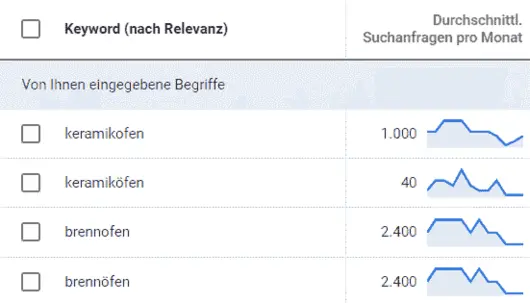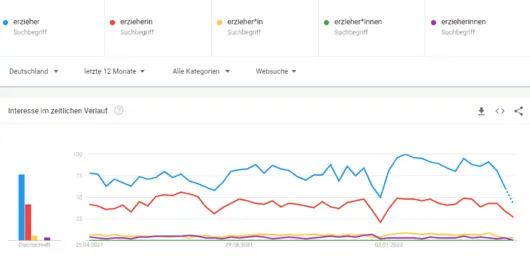GENDER, SEO AND USABILITY:
when the pursuit of equality discriminates against
Gendering is no longer a new trend. More and more, gender-neutral language is being used in everyday life. It is not only in spoken language that gendering continues to encounter opponents. There are also no clear rules for written texts. So what needs to be considered in terms of user-friendliness, SEO and the increasing importance of accessibility?
The topic of gendering is still polarizing and leads to problems and discussions. But how does gendering affect SEO? A closer look at the search results shows frightening effects on the ranking at Google and Co.
Discriminatory Google algorithm?
In a simple comparison of different spellings and the gender-neutral variant formation of search terms, the search results show clear differences. To test this, many different terms and their various gender-neutral spellings were checked. The following example shows the problem:
To show the problem, the profession of educator was searched for. By placing the search queries in quotation marks, websites are searched for which must contain this exact spelling of the term. Through Google, a search for "educator" yields about 4,970,000 results.
The numbers in comparison:
- "educator": approx. 10,300,000 results
- "erzieherin": approx. 4,970,000 results
- "erzieherinnen": approx. 2,590,000 results
- "erzieher*innen": approx. 7,250,000 results
- "erzieher:innen": approx. 379,000 results
The results show that "Erzieher*innen" is more widespread than "Erzieherinnen". However, the search for the generic masculine "educator" dominates the search results in the comparison. However, there are now changes in the algorithm, which, according to Google, would independently adapt to user behavior. If you search for "erzieher*innen" you will also find search results with "Erzieher/innen". The separator with the * is therefore equated with the variant "educators". This is where the algorithm really learns.
Anyone currently searching for this example in their everyday life usually uses the search terms "erzieher" or "erzieherin" and does not enter these terms in quotation marks. Occasionally, when visiting the websites, the spelling "Erzieher/in" or "Erzieher*in" is also found in the text on the first search results page. However, the gender-neutral spelling in the plural "erzieher*innen" did not produce any hits in the texts for these search queries. Why is that? Because the search behavior and the use of gender forms is very different. There is indeed counter-gendering in the content on websites, but no one searches like this. But why are the search results the way they are? Is Google really misogynistic?
Main opponent generic masculine
In order to get to the bottom of this question, we must first take a closer look at the German language. The generally accepted terms in Germany, for example for professions, are often so-called statements in the generic masculine.
"The teachers," "the students," "the drivers" - common terms familiar from everyday speech. Linguists rightly explain that these word forms have developed through language use. Due to word formation by appending or changing the word ending with the morpheme "-er", an activity, for example, becomes a job title.
"Teachers" are thus named after their activity in everyday life, teaching. The derivation of the designation should make one thing clear: One must clearly differentiate between genus (grammatical gender) and sexus (biological gender).
This article is not a valuation of gender or a discussion about its raison d'être. It is merely intended to highlight the problematic nature of gendering in relation to good rankings in Google's search results.
The use of a grammatical gender is only partially related to the biological gender. It is called "the car", "the engine" and "the tires". Why differences are made here between female, male and neutral does not follow any logic. However, it concerns here the genus, thus the grammatical sex.
At first glance, the question arises what these terms have to do with gendering. With the examples mentioned there is no reference to a biological sex. In the case of objects, gendering is also not an issue. Nevertheless, there are similar peculiarities in gender-relevant terms with reference to biological sex.
Germany was a great hostess
Even though officially the dictionary says "the guest", it somehow feels wrong. "The guest" has become established in linguistic usage. With "teacher" and "teacher's wife," on the other hand, both variants are common. Hostage, on the other hand, is. There is no masculine form in German grammar.
Switzerland would be a good hostess because Switzerland is female, but Germany is not. Nevertheless, the percentage of female citizens should be comparable (or is it female citizens because female is already in front of it?). The Swiss boxing federation was a good host because a federation is male. But does that mean that the Swiss Women's Federation is always a good host?
This excursion should make one thing clear: The topic of gendering is not only influenced by the striving for sexual neutrality, but is quite significantly under the influence of German grammar. Gender-neutral texts must work around and redefine the complex ways of forming words that have become established. However, as linguistics shows, there are no clear rules for the use of genera. Forcibly, this also infers sexus.
Even though gendering has been a present topic for some time, clear rules for gender-neutral writing do not exist. The German word formation and differences in forming a masculine and feminine designation is not as simple as for example in English. Non-binary designations do not exist at all in German for many occupational groups.
The problem is based on the natural development of the German language. This development without clear rules and with various special cases cannot be easily transferred into an algorithm. Ships are neutral, but ships with names are feminine. It is just "the Titanik".
Google's algorithm is not infallible
Google's goal is obvious: to provide users with the best and most relevant search results matching a search intention for every search query. To do this, of course, the algorithm must understand the search intention as well as the meaning of a word. The complexity of plural formation in the German language is also a challenge for Google. There is no universal recipe for the actual meaning and the connections between different word forms.
One example shows that Google finds it difficult to link word forms and their context. The plural of "kiln" is "kilns. Easy to understand in everyday language, this form of plural formation is complex for the algorithm.
Whether singular or plural often does not play a decisive role in the search. Google usually recognizes the connections and can thus output the potentially best page for the search query.
For a long time, Google returned different results for "brennofen" and "brennöfen". The plural formation was simply not comprehensible for the algorithm. In 2020, the algorithm understood that the same search intention was hidden behind it. The search queries per month in the official Google Keyword Tool now also show the same search volume. They have been combined. For "keramikofen", despite the same ending -ofen or -ofen, the same effect cannot be determined. But why?
User generated rankings
Google does not maintain updates in the algorithms for every special case in every language, but the algorithm analyzes the user behavior of the searchers. The search results are automatically adapted to the behavior of the users. However, this only works for search terms that are searched for. Opposite forms, however, are not searched for.
In the case of "brennofen" and "brennöfen", it was not the grammatical context that led to the two search terms being combined into one search intent. Instead, the users' search behavior and the websites they opened made Google understand that the same search intention was behind both terms. If this also happens with "ceramic stove" and "ceramic ovens", the monthly search volume will also be the same here. This only does not work for ceramic stoves because the search volume is very low and there is not enough user data for the algorithm to have enough data. Google's presentation of search results are consequently not primarily determined by Google, but actually user generated rankings. Users help determine the results through their behavior.
Back to the initial question: So is Google now hostile to women? These accusations are not new, as for example the Beitrag von Basic Thinking aus 2019 zeigt. However, Google does not consciously rank websites with masculine terms better. The generic masculine is still anchored in linguistic usage and the majority of the population still uses it in everyday life and in searches. The decisive problem for the poorer positioning of websites that explicitly use female or gender-neutral designations with the help of common special characters, such as the gender asterisk (*), is therefore not Google, but the use of these word forms in everyday life. The fact that today the generic feminine, let alone gender language, plays no real role in search is clearly shown by the following comparison.
The generic masculine is searched for the most. On the other hand, opposite-gender spellings or the feminine plural form are almost not searched for, and "erzieher*innen" is not searched for at all. However, Google also trains its own algorithms using these search queries. If these search queries are not present, the algorithm is not able to adjust the results accordingly.
The fact that Google wants to fulfill the users' search intentions is shown by another example. Whether one googles for "hairdresser" or "hairdressers", the search results are almost identical. In this case, Google recognizes the plural and singular as synonymous. However, if one googles for "hairdresser", differences in the search results are noticeable. Here, salons run by women appear more frequently. If you search for hairdresser, you hardly get any results with "female hairdresser" in the text.
So anyone searching for "female" is doing so deliberately, according to Google's results. Because apparently "female search results" are primarily clicked after a "female search." Consider the example of "gynecologist" versus "female gynecologist." People who want to be treated by a female doctor already take that into account in their search query. Searching with the generic masculine, on the other hand, does not directly imply that a man is being searched for.
Google thus merely takes into account the search intention and behavior and is not specifically misogynistic. Nevertheless, this inevitably leads to the fact that websites which only use female designations or counter-gendered spellings with gender asterisks (e.g. educators) or gender colons (e.g. educator:in) in their texts are disadvantaged and achieve poorer rankings in the search results. The indented I as in ErzieherIn usually has no effect and is ranked like Erzieherin.
One must strongly differentiate between what is written and what is searched. Content should never be created for the search engines, but the search results still provide information about how people search. Those who refrain from gendering will usually have an advantage in Google's rankings.
Top rankings with or without gendering
Gendering on websites can be a voluntary decision, but for some companies or authorities there are appropriately defined rules and gender-neutral language is mandatory. Depending on your own possibilities, there are the following recommendations:
1 ) Refrain from using gender language completely
The generic masculine is currently still the unwritten norm in language use. Personal attitudes go hand in hand with this choice, and the active abandonment of gender-equitable language can have equally negative effects, depending on the target group. In terms of visibility, however, it is the tried and true method. This solution is also absolutely barrier-free.
2 ) Name both word variants explicitly: journalists and journalists
This solution combines gender-neutral language with the frequently searched keywords. However, this can result in more than just advantages. There is a danger of so-called keyword stuffing. If both variants are consistently used and repeated, this leads to a conspicuously high keyword density, which can also have a negative effect on the ranking. So if you absolutely want to gender in relevant places, you should resort to this.
3 ) Use alternative gender-neutral terms
Instead of the different word variants, there are sometimes other words that can be used to make the same statement. For example, "employees" can be replaced by the gender-neutral wording "team", "employees" or "employees" in an equivalent manner. However, caution applies here as well. On the one hand, there are also discussions here as to whether all terms correspond to the actual original idea of gendering. For example, the generic feminine "teacher" is used as an alternative to the generic masculine "teacher." Just as there was once discussion against the exclusion of women by the term teacher, there is now discussion about whether "die Lehrkraft" does not exclude men because the genus of Lehrkraft is feminine.
There are already websites that make recommendations for such alternative gender-appropriate formulations. From an SEO point of view, however, these are often unsuitable. Here, human search behavior also plays the decisive role. A "book-writing person" as a neutral formulation for "author" is legitimate from the perspective of the origin for gendering. However, no one searches for such novel formulations, just like the common gender spellings. And it's not very readable either.
However, those who want to achieve good rankings may find a viable way in a balanced use of rules 1-3.
4 ) Use for the * or : a graphic
One method to be visible and understandable for Google despite gendering would be to use an inline graphic to display the gender-appropriate wording. However, there are several factors to consider in the technical implementation, such as matching the graphic to the background and font color.
In this way, Google does not recognize the two word components "journalist" and "inside" as one word that belongs together. For Google, the term "journalist" is in the text and accordingly a ranking is possible for such a search term. However, this variant is probably not optimal for accessible websites, since the word part "inside" is interpreted as a separate word.
Gender neutrality versus accessibility
The fact that gender-appropriate spelling is still new and problematic for technical processing is not only evident in Google's algorithm. Accessibility is by no means a new topic in website design. In order to be able to consume the content of a website, people with visual impairments use so-called screen readers to read the content.
The Barrier-Free Act (Barrierefreiheitsstärkungsgesetz, BFGS) has already made the barrier-free implementation of websites largely mandatory in 2021. Even if the rules do not come into force until 2025, they should already be taken into account today. Who wants to have to revise older content again? And anyone who deals with it will also improve the usability and SEO aspects of the website.
For this reason, the BDSV (Deutscher Blinden- und Sehbehindertenverband e. V. - German Association for the Blind and Visually Impaired) also considers gendering on websites to be an important criterion for barrier-free design. The DBSV makes clear recommendations: for blind and visually impaired people, writing in the opposite gender using the gender asterisk, an underscore or a colon is problematic. When read aloud, these special characters are usually either read over or read along with the text, which impairs the reading flow. Thus, "journalist*innen" becomes "journalist asterisk inside" for the screen reader. Just the thought of a text in which there is a great deal of counter-gendering and every special character is pronounced by the screen reader reveals the imposition on the understanding of the content of the text.
With common screen readers, various settings can be made so that, for example, a "*" in the text is not read out. The suppression of the special character is noticeable in a small pause in the audio transcription. The counter-gendered spelling would be pronounced similarly to how the gender-neutral terms are spoken in real life anyway.
At the same time, other usability issues arise again with such settings. The asterisk symbol (*) has other functions on websites besides its use as a gender asterisk. For example, the asterisk is used to indicate mandatory fields in forms. Deactivating the reading aloud of the symbol also restricts usability for visually impaired Internet users.
Similar to the Google algorithm, the unclear spelling rules are a challenge for the screen reader algorithms. Since no clear solution has yet been established in linguistic usage, the Liste nicht empfohlener Gender-Kurzformen des DBSVs should be taken into account. Here, too, the recommendation is to formulate both personal terms (employees) or to use gender-neutral formulations (team).

A contribution by:
Thomas
Thomas is an engineer and SEO evangelist at +Pluswerk.
Write to him at info(at)pluswerk(dot)ag



